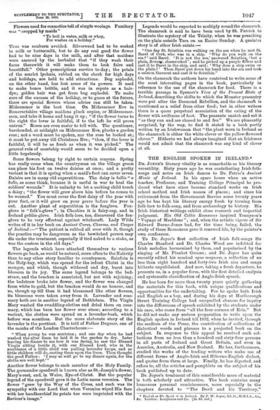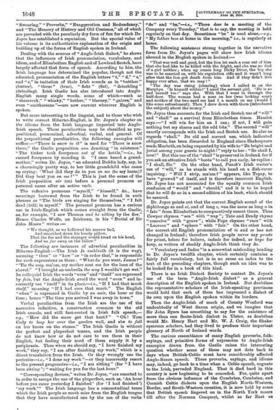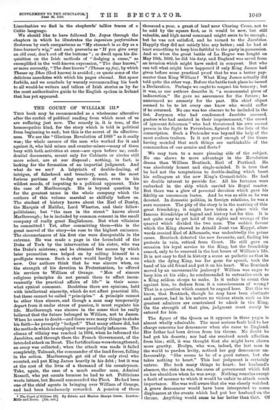THE ENGLISH SPOKEN IN IRELAND.* Da. JOYCE'S literary vitality is
as remarkable as his literary versatility. Sixty years ago he was contributing Irish folk- songs and notes on Irish dances to Dr. Petrie's Ancient Music of Ireland. In his spare hours when an active teacher, Professor, and Training College Principal he pro- duced what have since become standard works on Irish school method and Irish names of places ; and since his retirement from the Government Service some twenty years age he has kept his literary energy fresh by turning from folk-lore to folk-song, and from archaeology to history. His Irish historical writings exhibit close research and impartial judgment. His Old Celtic Romances inspired Tennyson's " Voyage of Maeldune "; and, when the artistic vigour of Sir Edward Burne-Jones had, for the time being, failed, the study of these Romances gave it renewed life, by the painter's own confession.
To Dr. Joyce's first collection of Irish folk-songs Sir Charles Stanford and Dr. Charles Wood are indebted for Irish melodies harmonised by them, and popularised by the singing of Mr. Plunket Greene ; and Dr. Joyce has quite recently edited his musical opus magnum, a collection of no less than eight hundred and forty-two Irish airs and songs hitherto unpublished. And now, taking a fresh departure, he presents us, in a popular form, with the first detailed analysis and systematic classification of Anglo-Irish speech.
He has been for more than twenty years quietly gathering the materials for this book, with unique qualifications and opportunities for the undertaking. For he spoke both Irish and English as a boy, and during his days at Marlborough Street Training College had unequalled chances for inquiry into the differences of speech exhibited by the students under his care, who came from "all the four corners of Erin." But he did not make any serious preparation to write upon the English spoken in Ireland till 1892, when he invited, through the medium of the Press, the contribution of collections of dialectical words and phrases to a projected book on the subject. In response to this appeal be received such col- lections from no less than a hundred and sixty-four persons in all parts of Ireland and Great Britain, and even in America, Australia, and New Zealand. He has, furthermore, studied the works of the leading writers who make use of different forms of Anglo-Irish and Hiberno-English dialect, and quotes from them at large. Finally, he has digested, and refers to, all the articles and pamphlets on the subject of his book published up to date.
Dr. Joyce's treatment of this considerable mass of material is both scholarly and attractive. The book contains many humorous personal reminiscences, more especially in the chapters devoted to " The Devil and his Territory,"
• English as We Speak it in Ireland. By P. W. Joyce, LL.D., BLE.I.A., &a, Ice. London : Longrnans and Co. Da. 6d. net.]
" Swearing," " Proverbs," "Exaggeration and Redundancy," and " The Memory of History and Old Customs," all of which are pervaded with the peculiarly dry form of fun for which Dr.
Joyce has established a reputation. But the special value of his volume is its authoritative explanation of the origin and building up of the forms of English spoken in Ireland.
Dealing with the sources of "Anglo-Irish dialect," he shows that the influences of Irish pronunciation, vocabulary, and idiom, and of Elizabethan English and of Lowland Scotch, have largely affected that form of speech. According to him, the Irish language has determined the popular, though not the educated, pronunciation of the English letters " t," " d," " s," and " z," in imitation of their Irish sounds as in " butther " (butter), " there" (true), " fight " (fist), " drizzbling " (drizzling). Irish Gaelic has also introduced into Anglo- English many single words, some of which—such as " shamrock," " whisky," " bother," " blarney," " galore," and even " smithereens "—are now current wherever English is spoken.
But more interesting to the linguist, and to those who wish to write correct Hiberno-English, is Dr. Joyce's chapter on the idioms from the Irish language imported into Anglo- Irish speech. These peculiarities may be classified as pre- positional, pronominal, adverbial, verbal, and general. Of the prepositional peculiarities, the following examples will suffice :—" There is snow in it" is used for " There is snow
there," the Gaelic preposition ann denoting " in existence." The tinker took fourpence out of the kettle,"—i.e., he earned fonrpence by mending it. "I once heard a grand- mother," writes Dr. Joyce, " an educated Dublin lady, say, in
a charmingly pretty way, to her little grandchild who came up crying : ` What did they do to you on me (to my harm) P Did they beat you on vie ?'" This is just the sense of the Irish preposition air (on) before a personal pronoun or personal name after an active verb.
The reflexive pronouns "myself," "himself," &e., have meanings borrowed from the Irish to be found in such phrases as "The birds are singing for themselves," "I felt dead (dull) in myself." The personal pronoun has a curious use in Irish-English which comes straight from the Gaelic, as, for example, "I saw Thomas and he sitting by the fire."
Hence Charles Wolfe, an Irishman, in his "Burial of Sir John Moore " writes :- " We thought, as we hollowed his narrow bed, And smoothed down his lonely pillow,
That the foe and the stranger would tread on his head, And we far away on the billow."
The following are instances of adverbial peculiarities in Fliberno-English :—The Irish Is amhlaidh (it is the way), meaning " thus " or " how " or " in order that," is responsible for such expressions as these : " What do you want, James ? " "'Tie the way, ma'am, my mother sent me for the loan of the shovel." " I brought an umbrella the way I wouldn't get wet." In colloquial Irish the words "even" and "itself" are expressed by fein, but the Anglo-Irish avoid the word " even " and in-
correctly use "itself" in its place,—i.e., "If I had that much itself," meaning "If I had even that much." The English " when " is expressed in Gaelic by an uair, the hour or the
time ; hence " The time you arrived I was away in town." Verbal peculiarities from the Irish are the use of the narrative infinitive, a construction common to the old Irish annals, and still fast-rooted in Irish folk speech,- e.g., " How did the mare get that hurt? " " Oh ! Tom Cody to leap her over the garden wall, and she to fall on her knees on the stones." The Irish Gaelic is without the perfect and pluperfect tenses, and the Irish people do not know how or do not care to use them in their English, but feeling their need of them supply it by a periphrasis. Thus when we should say, "I have finished my work," they say, "I am after finishing my work," which is a direct translation from the Irish. Or they wrongly use the preterite—i.e., "I done my work "—or they incorrectly resort
to the present progressive—i.e., "I am sitting" (for "I have been sitting ") " waiting for you for the last hour."
"Corresponding devices," writes Dr. Joyce, "are resorted to in order to escape the use of the pluperfect, such aa, 'An hour before you came yesterday I finished' (for ' I had finished ') my work." The Irish language has a consuetndinal tense which the Irish people so much miss from the English tongue that they have manufactured one by the use of the verbs
"do" and "be,"—i.e., "There does be a meeting of the Company every Tuesday," that is to say, the meeting is held regularly on that day. Sometimes "be" is used alone,—e.g.,
"My father bees at home in the morning," i.e., is regularly at home.
The following sentences strung together in the narrative form from Dr. Joyce's pages will show how Irish idioms
abound in the English spoken in Ireland :—
" That was well and good, but the lion let such a roar out of him that she had like to be killed with the fright, and she was no fool of a girl neither ; when up comes long Dicky Diver, the boy she was to be married on, with his regulation rifle and it wasn't long after that the lion got death from him. And if they didn't live happy ever after, that we may !"
" The day was rising (clearing) when I called in on the Murphys. ' Is himself within?' I axed the servant girl. 'He is so and herself too !' says she. With that I went in through the half-door. The woman had a nose on her (was looking sour) and neither of the two axed me had I a mouth on me (would I like some refreshment). Then I drew down with them (introduced the subject) about the money."
Dr. Joyce thus accounts for the Irish and Scotch use of "will" and " shall" as a survival from Elizabethan times. Hamlet says :—"I will win for him an I can; if not, I will gain
nothing but my shame and the odd bits." The second "will" exactly corresponds with the Irish and Scotch use. So also as regards " shall." Its old and correct use, which indicated obligation, has been discarded in England since Shakespeare made Macbeth, on being requested by his wife to "Be bright and
jovial among your guests to-night !" reply to her : " So shall I, love!" But this use of the " shall" is preserved in Ireland, for if
you ask an attentive Irish "boots " to call you early, he replies : " I shall, Sir." On the other hand, Punch's Irish waiter's use of " will," as he stands with his hand on a dish-cover
inquiring : " Will I strip, ma'am ? " appears, like Topsy, to have "growed " of itself, and is therefore incorrect English. Dr. Joyce has not accounted for the equally common Irish confusion of " would " and " should," and it is to be hoped that he will do so in a second edition of his book, which should
be assured.
Dr. Joyce points out that the correct English sound of the diphthongs ea and ei, and of long e, was the same as long a in " fate " from Elizabethan to comparatively recent times. Thus Cowper rhymes " sea" with " way "; Tate and Brady rhyme " conceive " with " grave " ; while Pope rhymes " race " with " Lucrece " and " sphere " with " fair." On the other hand,
the correct old English pronunciation of ie and ee has not changed in Ireland ; therefore Irish people never say praste for priest, belave for believe, indade for indeed, or hope for keep, as writers of shoddy Anglo-Irish think they do.
" Vocabulary and Index " is a somewhat misleading heading to Dr. Joyce's twelfth chapter, which certainly contains a fairly full vocabulary, but is in no sense an index to the text of the preceding chapters, though such an ides was to be looked for in a book of this kind.
There is no Irish Dialect Society to contest Dr. Joyce's use of the term "Anglo-Irish dialect" as a general description of the English spoken in Ireland. But doubtless the representative scholars of the Irish-speaking provinces would hold that each of them has impressed a dialect of its own upon the English spoken within its borders.
Then the Anglo-Irish of much of County Wexford was undoubtedly of West Saxon origin, and we imagine that Sir John Byers has something to say for the existence of more than one Scoto-Irish dialect in Ulster, as doubtless
would Mr. Henry Hart and Mr. W. J. Craig, the Shake- spearean scholars, had they lived to produce their important
glossary of North of Ireland words.
The curious resemblance of many English proverbs, folk- sayings, and primitive forms of expression to Anglo-Irish examples drawn from the Gaelic raises the interesting question whether some of these may not date back to days when British-Celtic must have considerably affected Anglo-Saxon speech. These proverbs, sayings, and idioms may, indeed, go back to a time when a Celtic speech, cognate to the Irish, pervaded England. That it died hard in this country is now beginning to be conceded, For, quite apart from the obvious influence of the Cumbrian, Cambrian, and Cornish Celtic dialects upon the English North-Western,
Border, and South-Western counties, it is now held by some that British speech lingered on in the North York moors till after the Norman Conquest, whilst so far East as
Lincolnshire we find in the shepherds' tallies traces of a Celtic language.
We should like to have followed Dr. Joyce through the chapters in which he illustrates the ingenium perfervidum. Seotorum by such comparisons as "My stomach is as dry as a lime-burner's wig," and such proverbs as " If you give away an old coat, don't cut off the buttons " ; or dwell upon his dis- quisition on the Irish methods of " dodging a curse," as exemplified in the well-known expression, " The dear knows," or more correctly, " The deer knows " (Thaws ag fee), by which Thaws ag Dhee (God knows) is avoided ; or quote some of the delicious anecdotes with which his pages abound. But space forbids, and we conclude by warmly recommending his book to all would-be writers and tellers of Irish stories as by far the most authoritative guide to the English spoken in Ireland that has yet appeared.
























































 Previous page
Previous page